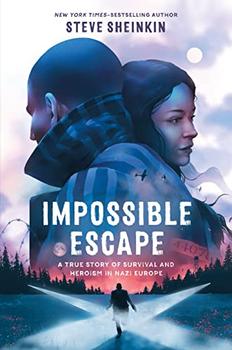Summary | Excerpt | Reviews | Beyond the Book | Readalikes | Genres & Themes | Author Bio

A True Story of Survival and Heroism in Nazi Europe
by Steve Sheinkin
Rudi's home, Slovakia, became an independent state. In theory. In reality, the small country was dominated by Germany and led by a pro-Hitler president, Jozef Tiso.
This is when Rudi and his Jewish friends knew their world had changed.
* * *
Rudi's friend Gerta Sidonová was twelve in the summer of 1939. Gerta—or Gerti to her friends, but never Gertrúda, which she hated—was a thin girl with wavy blond hair and blue eyes. She loved to write and perform plays with her friends and dreamed of becoming a filmmaker.
One warm morning that summer, Gerta and a non-Jewish friend named Marushka rode their bicycles out of Trnava and along dirt roads between fields of ripening corn. After about an hour, they stopped to sit in the shade. They were talking about fishing later, about catching some of the flies buzzing around them for bait, when Marushka blurted out: "My father said I shouldn't have come out with you today."
Gerta was stunned. Marushka's father worked in Gerta's family's butcher shop. He'd always seemed like a nice man.
"Why not?" she asked.
Her friend blushed before answering. "He said that because you are Jews, you will soon be taken away, and then he will be able to take over your father's shop and we will move into your house." Until all that happened, Marushka explained, her family had to be careful not to be seen mixing too much with Jewish people.
Gerta didn't know what to say. She'd never thought of friends in terms of their religion.
Finally she asked, "And what do you think about this?"
"I don't know," Marushka said, looking out at the fields, avoiding her friend's eyes. "I'm confused and will miss you, but if it's going to make it difficult for my family that I have a Jewish friend, I'll have to stop seeing you."
"That isn't really what I meant," Gerta said. She wanted to know what Marushka thought of the idea that Jewish families should be thrown out of their homes and sent away.
Marushka launched into a recital of tired old stereotypes about Jews being obsessed with money and needing to learn the value of hard work. Gerta had heard this garbage before but had no idea her friend believed it. Marushka knew Gerta's mother woke at 5:00 a.m. to work in the family shop before heading off to a second job. Their friend Rudi's mother was a seamstress who made dresses in her living room. How could anyone say they needed to "learn" hard work?
Was Marushka just repeating things she heard her father say?
Was she tempted by the opportunity to move into Gerta's house?
To Gerta, the strangest part of the whole conversation happened when she grabbed her bicycle and was about to ride off. Marushka called out, "But today we could have enjoyed ourselves."
Too furious to respond, Gerta got on her bike and pedaled toward home.
2
ON SEPTEMBER 1, 1939, HITLER launched an invasion of Poland, igniting World War II.
Britain and France were bound by treaty to fight alongside their Polish allies—but they were unprepared for a major war. Hitler's forces overran the Polish capital of Warsaw by the end of the month.
In Slovakia, following Hitler's lead, the government enacted a series of anti-Jewish laws. Signs warned Jews not to enter movie theaters or sports stadiums. Jewish citizens had to be off the streets by eight at night. Laws restricted where they could live, where they could work, how far they could travel without special permission. The government assigned non-Jewish "advisers" to work in—and prepare to take over—Jewish-owned shops. Another law required Jews to wear a yellow Star of David in public, six inches in diameter, sewn onto their clothes with a specific number of stiches.
When they showed up for the first day of school, Jewish students were not allowed inside.
Excerpted from Impossible Escape by Steve Sheinkin. Copyright © 2023 by Steve Sheinkin. Excerpted by permission of Roaring Brook Press. All rights reserved. No part of this excerpt may be reproduced or reprinted without permission in writing from the publisher.
Talent hits a target no one else can hit; Genius hits a target no one else can see.
Click Here to find out who said this, as well as discovering other famous literary quotes!
Your guide toexceptional books
BookBrowse seeks out and recommends the best in contemporary fiction and nonfiction—books that not only engage and entertain but also deepen our understanding of ourselves and the world around us.